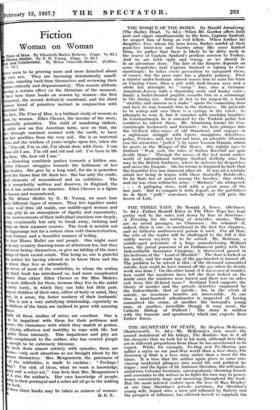Fiction Woman on Woman
78. 6d.)
N seem to be growing more and more detached about own sex. They are becoming determinedly unself-
ious, standing back from themselves and reviewing their nions critically and dispassionately. This remote attitude Laving a certain effect on the literature of the moment. have here three books on women by women—the first elemental, the second delicately emotional, and the third urious blend of primitive instinct in conjunction with lleetual life.
'he first, The Time of Man, is a brilliant study of woman as pan, by woman. Ellen Chesser, the heroine of the story, essentially primitive. The child of wandering tinkers, settle now on this American farm, now on that, she ss, through constant contact with the earth, to have Fn her qualities from the very soil. She is as maternal .eres and the wisdom of years weighs upon her, when she s, " I'm old, I'm so old, I'm about done with liven. I can how old I am. I'm old and old and old. I've been in life pig time. Oh, how old I am."
a thrusting cornblade pushes towards a hidden sun,
Ellen Chesser struggles towards the fulfilment of her mg desires. She goes by a long road, for she is powerless vert the blows that life deals her. She has only the crude, nal elements of womanhood and no subtleties. The k is remarkably written and deserves, in England, the ass it has achieved in America. Ellen Chesser is a figure Le known and remembered.
The Misses Mallet, by E. II. Young, we meet four
pely different types of women. They live together under Fame roof (two old maids, one middle-aged woman and Dung girl) in an atmosphere of dignity and equanimity, the undercurrents of their individual emotions run deeply, Ling occasionally but only to break away, twisting and
ing on their separate courses. The book is notable not
happenings but for a certain clear cold characterization, even balance and a beautiful manner of telling.
e four Misses Mallet are real people. One might meet
in any country drawing-room at afternoon tea, but they Id never betray themselves, or give an inkling of the inner icings of their varied minds. This being so, one is grateful the author for having allowed us to know them and the
where they live so intimately.
N wives of most of the celebrities, to whom the author he third book has introduced us, lead more complicated tences than either Ellen Chesser or the Miss Mallets. is more difficult for them, because they live in the midst
hurly burly, in which they can take but little part.
ng no children of their own, either of body or mind, they Pore, in a sense, the foster mothers of their husbands'
This is not a very satisfying relationship, especially as le children of the brain are inclined to grow with amazing tness.
early all these studies of wives are excellent. One is to be impatient with them for their pettiness and 'Aisles, the clumsiness with which they snatch at genius,
I Cloying affection and inability to cope with life, but pities them intensely. This impatience and pity are
Ibtle compliment to the author, who has created people e enough to be extremely tiresome. the book deals almost entirely with episodes, there are
°I)ries—only such situations as are brought about by the meters themselves. Mrs. Morganstern, the patroness of of the celebrities, is made to exclaim : " Feelings hags I'm sick of them, what we want is knowledge, IstrY and a soLer art." One feels that Mrs. Morganstern's
is also the author's. Her own knowledge of people, Airy in their portrayal and a sober art all go to the making is book.
11 these three books may be taken as mirrors of woman-
B. E. T.










































 Previous page
Previous page